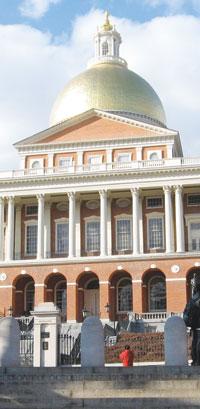College students from all across the state organized at the State House last month to address the increasing costs of their education. Rather than raising tuition, which has remained constant for eight years, the Board of Trustees has once again voted to raise fees for the 2007-08 school year. The increase was 3.4%, just under the current rate of inflation of 3.5%.
Tuition costs and other fees, often labeled with arbitrary titles, have always been one of the major concerns for college students nationwide. One might wonder then, why the price of a college education always seems to be on the rise, and why it costs so much in the first place.
“The money goes towards educating you [the student]” explains State Representative Kevin J. Murphy. But Murphy, chairman of the Joint Committee for Higher Public Education, also states his key issue of concern of whether these extra costs are “really related to educating you in the classroom.”
When students receive their bills just before the beginning of a new semester, many are surprised at what they find. Not only are we charged with tuition, which has remained relatively low and consistent, but also a multitude of fees. This lump sum is comprised of numerous expenses that the average college student does not have the time or wherewithal to investigate.
Many students hold the incorrect belief that fees are just laboratory and sports expenses. The Board of Trustees, who adjust fees each year, have failed to correct students mindsets and enlighten us as to where and what our money is actually being spent on.
The fact is that students must pay for their education. But do any of us truly understand what we are paying for? Among the list of fees we are required to pay are administrative costs. One may infer that these costs go towards the salaries of professors, the Chancellor, and everything in between. But when students at UMass Lowell signed checks for the university they probably did not know they were paying for the salaries of five new vice-chancellors, each making $175,000 a year.
The recent fee increase is based on the consumer price index, an indicator of increases in the general cost of living in the nation. This past year the index shows the cost of living went up 3.5% for the Boston area. The Board of Trustees was able to keep increases in student fees at 3.4%, under the rate of inflation.
In years prior, however, “the legislature wasn’t adequately funding higher education in Massachusetts” Murphy admittedly stated. This lack of funding led to large leaps in fees. “From 2002 our fees have almost doubled,” Alex Kulenovic a student member of the UMass system’s Board of Trustees, explains.
Kulenovic is also heavily involved in PHENOM, the Public Higher Education Network of Massachusetts, a new organization founded just four months ago with five key principles: fund public higher education in order to serve the Commonwealth, make higher education affordable, make higher education accessible to all, hire more teachers, researchers and staff, and honor and expand democratic institutions of governance for higher education.
PHENOM had its first Lobby Day at the State House last month with “decent attendance” Kulenovic observed. The organization represents 29 campuses across the state from community colleges to the UMass system. Students from UMass Boston, UMass Lowell, Framingham State and others came to show their support on February 22nd. Not surprising, however, by far the most turn out came from UMass Amherst, where the ground work began for PHENOM.
A “Public Higher Education Summit” was held at UMass Amherst on the first of December last year, attended by hundreds including Deval Patrick. With his election as governor, the organization hopes to “have a unique opportunity to push forward a bold, progressive agenda for quality, affordable, well-funded public higher education” according to PHENOM’s statement of purpose.
The meeting on Dec. 1st gained noteworthy attention, which has lead to considerable discussion concerning the main issues of public higher education in Massachusetts as PHENOM sees them: “will our system become increasingly under-staffed, inaccessible, and subject to the whims of private donors, or will we be able to finally build a fully-funded, affordable, accessible, fully-staffed and democratic system of public higher education that serves ALL the residents of the commonwealth?”
The Lobby Day incorporated students, staff and faculty, as well as the interested public into an organized event to address these issues on democracy’s doorstep. Another Lobby Day in April has been tentatively set by PHENOM with the hopes of more attendance and issues of concern and solutions to present to all those who will listen.
Rep. Murphy offers consolidation as one way to cut down on unnecessary costs. When UMass Boston students send in their tuition payments, the check is mailed to UMB. The same occurs at UMass Dartmouth, UMass Amherst and UMass Lowell. But because the universities are all members of the same system, Murphy recommends one central accounting office. As opposed to an office at each school where students must pay at least some fraction of the salaries and expenses for each person employed, a joint office would cut down on some of the excessive fees we are subject to each semester.
The increasing costs of universities, no matter the fees or tuition, are disabling students from attending the universities they desire to be a part of. For many, the amount we owe will soon exceed what we can pay, and the rest will be left paying the salaries for teachers who have no one to teach.





















































